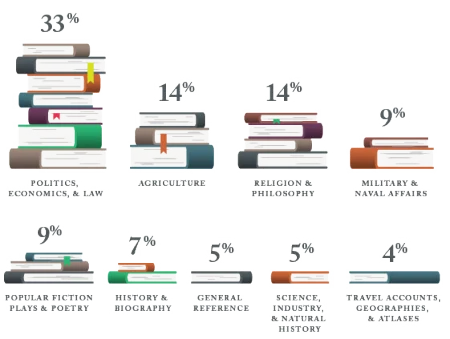Washington's Pursuit of Knowledge
George Washington’s formal schooling ended by the time he was 15, but his pursuit of knowledge continued throughout his life. Born in the Age of Reason, he was part of a new generation of readers that had access to more information than ever before. He read to become a better soldier, farmer, and president; he corresponded with authors and friends in America and Europe; and he exchanged ideas that fed the ongoing agricultural, social, and political revolutions of his day.
As a young man, George Washington copied out 110 “Rules of Civility and Decent Behaviour in Company and Conversation” from a popular English text, Youth’s Behaviour, or Decency in Conversation Amongst Men. The rules instruct students to practice consideration and respect towards others, by paying careful attention to body language, dress, and speech.
Youth's Behaviour, or Decency in Conversation Amongst Men
Translated and edited by Francis Hawkins. London: S. Griffin, 1668
Courtesy Washington State University

“I have a great many instructive books, on many subjects, as well as amusing ones.”
- GEORGE WASHINGTON to Lawrence Lewis, August 4, 1797
Washington's Library
Washington collected more than 1,200 publications over the course of his lifetime. Kept in custom bookcases in his study at Mount Vernon, these books, pamphlets, and newspapers connected him to ideas, events, and people from around the world.
Political works dominated Washington's collection
Washington’s library was his go-to source when researching politics, farming, and warfare, but it also provided a rich source of entertainment, in the form of novels, plays, and poetry, as well as food for thought, in works on religious and philosophical subjects.

“I conceive a knowledge of books is the basis upon which other knowledge is to be built.”
- – GEORGE WASHINGTON to Jonathan Boucher, July 9, 1771
Discovering Washington the Reader
Deciphering what Washington read, how he read, and how it influenced him has occupied scholars for the past two centuries. With careful study, letters, purchase records, and the books themselves all yield clues that can lead to a better understanding of Washington as a reader, and by extension, as a leader.

“Every hour misspent is lost forever... endeavour not only to be learned but virtuous.”
- – GEORGE WASHINGTON to his nephew, George Steptoe Washington, December 5, 1790





